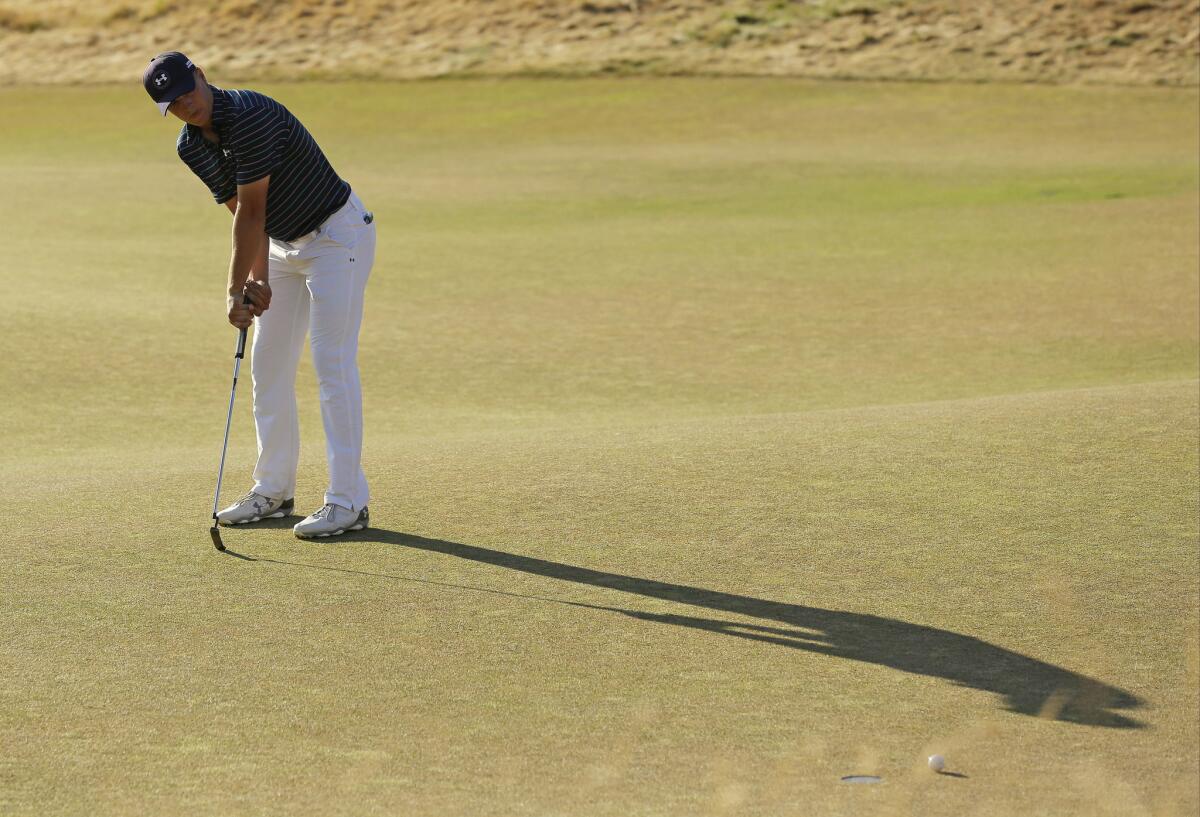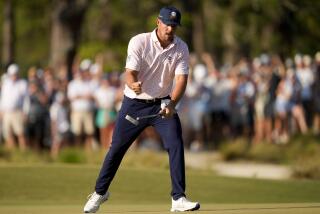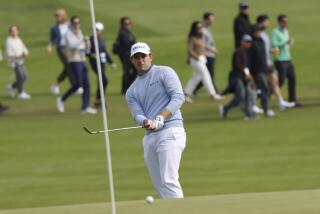U.S. Open winners? Jordan Spieth and those Chambers Bay greens

Jordan Spieth misses a putt for eagle on the 18th hole during the final round of the 115th U.S. Open at Chambers Bay in Univeristy Place, Wash.
- Share via
REPORTING FROM UNIVERSITY PLACE, Wash. — Hey, at least the USGA got the weather right. And no one could mess up those screensaver-worthy views of Puget Sound.
And the finish … whoa.
No one who witnessed what transpired on the 18th green Sunday will soon forget it, least of all Dustin Johnson. He three-putted from 12 feet to cough up the U.S. Open — or even a shot at it in a Monday playoff.
The winners: Jordan Spieth — and the Chambers Bay greens.
Henrik Stenson and Rory McIlroy were among those who mocked them, with Stenson saying it was like putting on broccoli and McIlroy countering that broccoli is green and “they’re more like cauliflower.”
You won’t hear any complaints about them from Spieth, who is barely old enough to drink but earned another champagne toast after his victory at the Masters in April and now heads to St. Andrews for next month’s British Open with Grand Slam dreams intact.
“We conquered golf’s hardest test,” he said.
His “we” represents what he calls his team, starting with right-hand man Michael Greller, his regular caddie with the remarkable local connection. Greller was a sixth-grade teacher who looped about 40 rounds at Chambers Bay as a summer gig after the course opened in 2007. He also got married near the first tee.
“Michael shoved positive thoughts in my head all week,” Spieth said. “He deserves a lot of the credit.”
Told that Greller was conducting his own Q&A at a podium outside, Spieth said: “He deserves to be doing interviews. I just wonder if he’s giving away what I said to him and embarrasses me.”
No chance.
Greller, 37, said his local knowledge “really wasn’t worth anything.”
“Jordan is one of the best players in the world,” he said, “and I was just trying to stay out of his way. The guys I caddied for usually couldn’t break 90, and I can’t break 80.”
Greller said Spieth’s play on No. 18 “captures his mentality and grit.”
The 18th was set to play as a par four Sunday, as it did Friday, when Spieth called it the “dumbest” hole he had ever seen. He even threatened Saturday night to play up the first fairway, making a mockery of what was designed to be a par five.
USGA President Tom O’Toole said that a wind shift caused the officials to scrap the par-four idea and that as a side benefit, the medium-length par five could “ultimately produce an exciting finish” — and it did: the first birdie at No. 18 to win a U.S. Open by one shot since 1926.
Despite being 601 yards, it ended up playing more like a par four anyway. Spieth ripped his approach from 284 yards to 15 feet, two-putting for a final-round 69 and five-under total.
Spieth figured he would either fall to Johnson, who had 12 feet for eagle, or the two would square off Monday in a playoff. “Crazy stuff happened,” Spieth said.
“I don’t know what happened,” Greller echoed.
Johnson’s first putt slid four feet past the hole. He pulled the next for a stunning miss. The USGA got its drama, albeit in a moment of failure.
“Whatever the [birdie] putt did on the last hole, I don’t know,” Johnson said. “To me it looked like it bounced a little left. It’s tough. It’s very difficult.”
Johnson had an incredible ball-striking round and hammered a five-iron from 247 yards into No. 18 to set up the eagle chance. Despite the stunning defeat, he walked off the course smiling, holding young son Tatum.
“My trophy at the end of the day is holding up my little man,” he said. “No matter what, I’m going to keep my head high and I’m going to be happy.”
Not as happy as Spieth, whose respect among his peers continues to soar.
“The expectations are set for the moon, and he has been able to handle himself in a way that not many kids could do — not many people could do,” said Jim Furyk, a veteran of 21 U.S. Opens. “At his age, I would have been a mess.”
More to Read
Go beyond the scoreboard
Get the latest on L.A.'s teams in the daily Sports Report newsletter.
You may occasionally receive promotional content from the Los Angeles Times.











